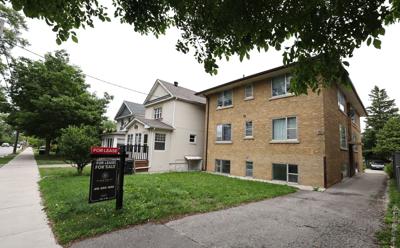The idea that Olivia Chow was going to be ╬┌č╗┤½├ĮŌĆÖs housing champion was always a fantasy. Many voters, especially younger ones, pinned their hopes on her after years of inaction by John Tory, which they wrongly ascribed to his more conservative ethos. In a quick election, ChowŌĆÖs long-standing brand as a ŌĆ£progressiveŌĆØ helped carry her to victory.
When it comes to housing, however, it appears Chow is anything but.
Rather, the signs all pointed to Chow being remarkably regressive on housing. ItŌĆÖs a myth that left-wing politicians make better housing warriors. True, they may be more likely to support spending on social housing and measures like rent control. But these arenŌĆÖt how ╬┌č╗┤½├ĮŌĆÖs housing crisis will be solved.
So it was infuriating, but entirely predictable, that when city council recently had a chance to legalize sixplexes (buildings with up to six units) across the city, Chow would flop. Last week, council instead only voted to allow sixplexes in nine of 25 wards, allowing more suburban ones to opt in. Chow made no attempt to publicly campaign for sixplexes, did not speak in support of them at the vote, and clearly failed at marshalling enough votes for that the policy. Worse, the city already committed to it as part of accepting $471 million from the federal governmentŌĆÖs Housing Accelerator Fund in 2023.
Including only nine wards not only puts a large amount of federal funding at risk. It also means ╬┌č╗┤½├Į has somehow yet again chosen to prevent the creation of more housing.
As frustrating as this is, the mayorŌĆÖs and councilŌĆÖs failure makes sense once you realize the real divide on housing these days isnŌĆÖt best viewed through a left-right lens. ItŌĆÖs a generational divide between those who understand that there is a housing crisis, those who donŌĆÖt ŌĆö and also, those who think they do, but whose understanding of the problem is decades out of date.
Chow falls into that last category. This became obvious to me at TVOŌĆÖs , where other candidates advocated for a wide range of solutions including broad upzoning and permitting multiplexes as essential ways to improve affordability. Chow, however, was solely focused on social housing built by the government, and for only the lowest income earners.
That approach is wildly insufficient and rooted in a decades-old grasp of housing. ItŌĆÖs not that affordable housing isnŌĆÖt important anymore; itŌĆÖs that affordability is now a sweeping, trickle-down issue in which it isnŌĆÖt just a minority of people struggling with affordability. When a young Bay Street professional can only afford the smallest of units or a basement apartment, that in turn pushes the lower-income worker who used to occupy those spaces ever farther down the ladder ŌĆö or off it entirely.
While the lowest income earners canŌĆÖt be ignored, the real solution to ╬┌č╗┤½├ĮŌĆÖs modern housing crisis must aim to make it possible again to live a middle-class lifestyle on a middle-class income, and create spaces for families without generational wealth to build lives in the city.
It means building more family-sized homes in attractive, existing neighbourhoods. That requires upzoning and legalizing ŌĆØmissing middleŌĆØ multiplexes ŌĆö precisely the thing only half-heartedly implemented by council ŌĆö and which exist without issue in beautiful urban neighbourhoods around the world. Crucially, government housing alone canŌĆÖt match the scale of our supply needs. Private developers and market housing are key parts of the affordability puzzle.
Suburban councillors will always be motivated to resist such reforms, egged on by the loudest NIMBY constituents with the most time on their hands, and who are often also retirees removed from the crisis.
But itŌĆÖs a mayorŌĆÖs responsibility to see the bigger picture and push for needed changes that benefit all ╬┌č╗┤½├Įnians, especially the next generation. Unfortunately, ChowŌĆÖs archaic world view doesnŌĆÖt understand that younger workers, even those making objectively good incomes, are now part of the disenfranchised, disadvantaged constituents she needs to fight for. They are in desperate need of bold solutions.
After the sixplex vote, any lingering belief about ChowŌĆÖs ability to solve the housing crisis should be dead and buried. ╬┌č╗┤½├Į needs a pro-housing mayor for today and tomorrow, not one stuck in the past.



























To join the conversation set a first and last name in your user profile.
Sign in or register for free to join the Conversation